So, there is lots of commentary on trying to figure out what this all means. Yet most of this is in a very short-term window, discussing the change from either 2015 or from a few months ago. I wanted to figure out what was going on in a way I hadn’t seen elsewhere, my looking at numbers and graphs, so thought I would share.
***
Contains:
- Table/Graph of SEATS
- Table/Graph of VOTE PERCENTAGE
- Table/Graph of VOTE NUMBERS (because turnout increased)
- Some brief analysis
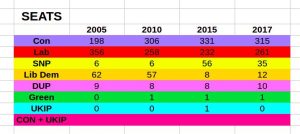
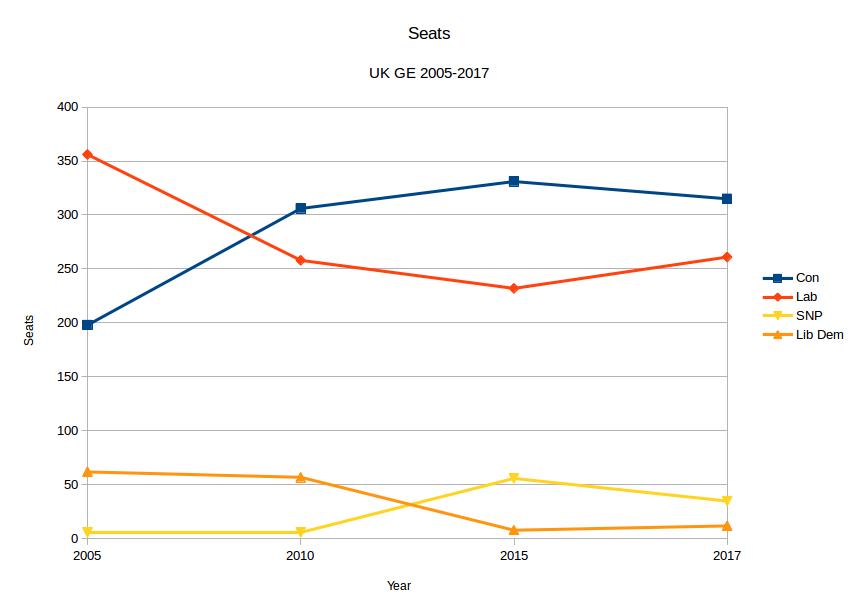
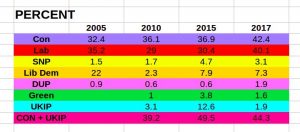
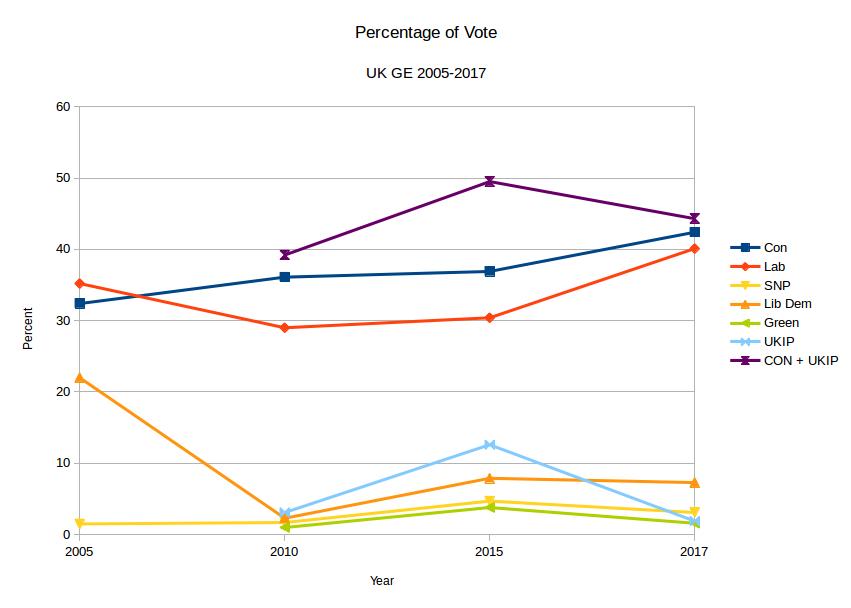
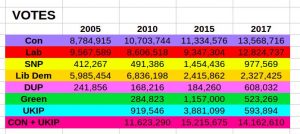
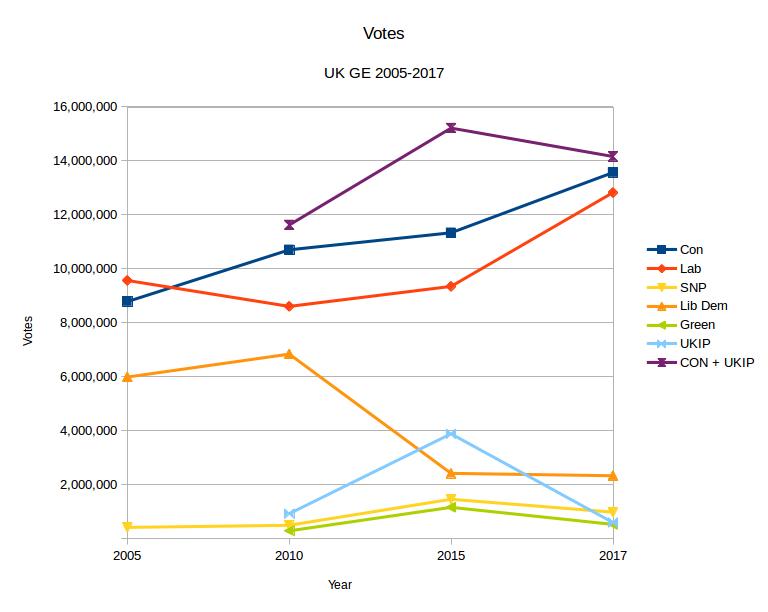
Analysis on the Numbers
- Bearing in mind we have a voting system which is winner-takes-all in each constituency… so overall vote ends up quite different to the seats won.
- Conservatives lost 13 in total, Labour gained 29, Lib Dems gained 4. In Scotland, SNP lost 21.
- Let’s look at Scotland first. The SNP came out of nowhere in 2015: they had 6 in 2005/2010, then exploded with 56 (almost all of them) in 2015. These gains were Labour losses: in 2010 there were 40 Labour MPs in Scotland. Yet in this election, the SNP dropped down to 35: still a majority and still huge compared to pre-2015, it is a loss.
- 13 seats were won by the Conservative Party in Scotland, 6 by Labour (7 total), 4 Lib Dems.
- In England and Wales, that means that the Conservatives lost 26! Which is a big change.
- The Conservative Party gained votes. Which might look surprising. But the important bit is to see it in combination with UKIP. The Conservative Party got about the same vote percentage in 2010 and 2015, but UKIP got a lot more in 2015. This didn’t translate to more seats though, UKIP had 1 seat for their 3.8m votes. Now, UKIP vote dropped to 600k. 3.2m lost, and 2.2k gained by Conservatives. Now, some of this Conservative gain is in Scotland from SNP, but in England presumably most of it is from UKIP voters. So that is why they are higher.
- Lib Dems gained a few seats (8 -> 12) but still nowhere near the 60ish they had before going into coalition. They actually lost votes by a small amount – presumably because of targeted voting to avoid Conservatives, where Lib Dem supporters in seats where Labour might win a seat voted Labour (and vice versa in the few places Lib Dems did win). Greens probably lost votes for a similar reason.
Brief Analysis – What Do The Results Mean
- We could compare the election on the whole picture – Conservatives still the biggest party, even without a majority. There is also the comparison of: compared to pre-election, February 2017, which shows a huge gain by Labour.
- This graph shows opinion poll results since 2015 election. As soon as the election was called, some UKIP would-be-voters shifted straight to Conservative, and since then Labour has been gaining steadily with Conservatives declining.
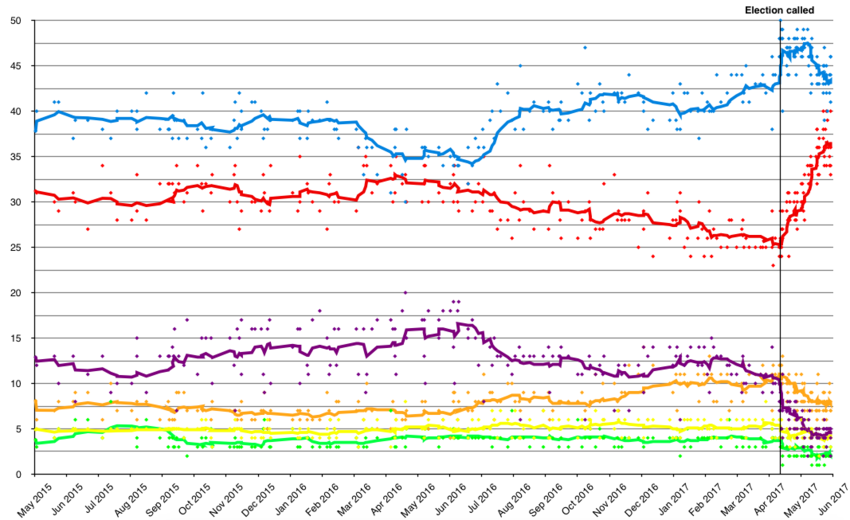
- Theresa May called the election because she wanted to GAIN SEATS. She had a small majority of 6 (331), which means that if even a small number of Conservative MPs disagree she would lose it. She FAILED: she lost 13 seats, now on 318. She wanted stability, she has done the opposite.
- The ‘win’ for Labour/Corbyn is in this gain. Corbyn is vindicated, showing he is electable and has made Labour more successful than Ed Miliband (2015) and Gordon Brown (2010) did. They actually have the same seats 2017 as 2010, but much more of the vote. It was never going to be possible for Labour to win the most seats, at least in such a short space of time (and such negative media campaigning), but it is a win that they gained the 29 gained seats and huge percentage support.
- Typically this would mean Theresa May would resign, as David Cameron did after losing the Brexit referendum, which he called very sure he would win and did to placate the anti-EU people. So he resigned. Theresa May should do the same. It’s shambolic what she did. Of course, she might not resign immediately, but could announce it anytime today. It will come ‘suddenly’ in that there will be announcements that she won’t resign, then this will change: of course nobody so far this morning is admitting she might resign because that shows weakness, it’s always done by pretending to be strong until the moment of resignation. Not sure who would follow her… they only recently had a leadership campaign, so it looks like a Conservative Party in big decline (Cameron, Osborne, May all having messed up, and others with issues).
- It looks like there will be some agreement between the DUP – Democratic Unionist Party – in Northern Ireland, who with 10 seats would bring it to 328, 3 over the 325 majority. I don’t know much about them (apart from being pro-Union!) for what they would demand and how this would change. But it’s a MUCH weaker conservative party.
- There was also investigation for electoral fraud: the Conservatives had done some pretty dodgy stuff of spending more money that was allowed on local campaigning – the point is to stop rich parties having a big advantage by limiting it at £100k per constituency – but allocating the money to national spending. In the end it was kinda weak, but part of the election calling might have been incase 10 or so Tory MPs lost their seats due to the fraud.
- So there will likely be another election sometime soon, it doesn’t look like it could carry on much. At the moment.
- Finally, the HUGELY NEGATIVE MEDIA COVERAGE AGAINST CORBYN deserves a mention. Most people vote without a huge amount of information. Almost all of the media was very against him, with personal attacks about his ‘terrorist sympathising’ (basically lies) and misrepresenting his tax raised on the richest 5% and corporation tax as being increased tax for all. This media is horrific, dirty propaganda that is not what ‘democracy’ should look like that does not discuss actual policies but just attacks with an agenda. Corbyn is more left-wing than previous Labour leaders, so poses much more of a threat to vested interests of billionaire-owned corporate media. This will be hard to shift in the future…
- Looking to the future, Labour was on the increase. Since the election was called, they have been growing and growing. Theresa May did a very-short-notice election for this reason. That looks positive for the future.
***
This was all made and written fairly quickly this morning, I expect I will have made mistakes. So please discuss!